Professional tool for market research surveys
Our customized online survey tool enables you to create individual surveys and conduct cost-effective market research.
AI assistant ![]() for analyzing and interpreting the results. Book your demo now!
for analyzing and interpreting the results. Book your demo now!
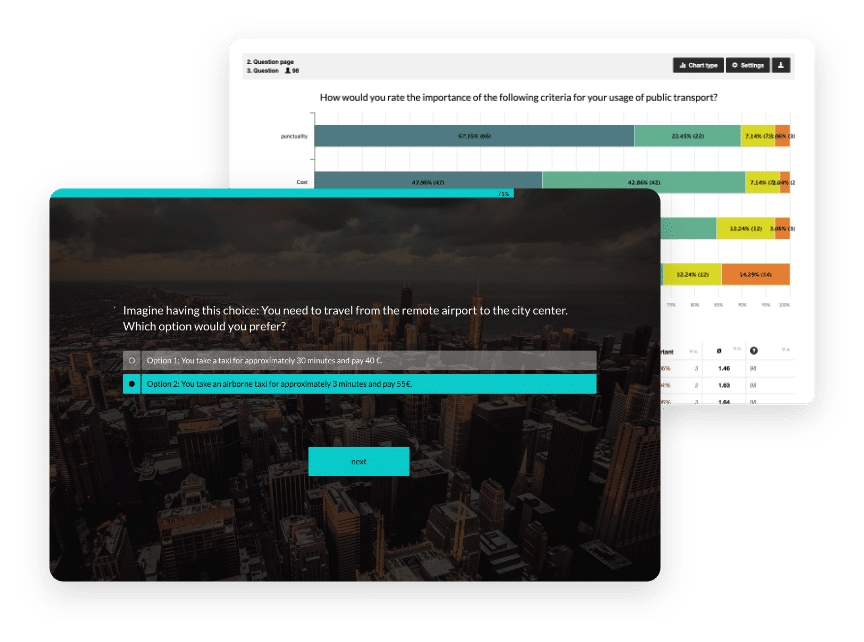



Get to know your market and target group with online market research
Market research can and should be a constant companion in the development of every company.
Only those who know their target group and the market can optimally align their product or brand to their needs.
With online surveys, you can cost-effectively find out the needs of your target group and gain a knowledge advantage over the competition and position yourself better.
Why you should do market research
Market research is not just the preserve of large corporations. Every bakery, pharmacy or gas station should regularly survey its customers and conduct market research.
Which product is particularly well received? What additional products would customers like to see? Where do customers see deficits: service, price/performance, variety of offerings, lack of advertising/communication?
Only by surveying your customers and potential customers can you get to know the market and react to developments.
Use the potential of surveys and increase your business success. The big advantage is the fast implementation at low cost with easyfeedback.
As a rule, 75% of those taking part respond within the first 3 days.
This means that you receive usable results on the planned measures in a short time and can react quickly to changes.
Use easyfeedback as a flexible survey tool and improve your position compared to the competition.
Implementation of a market research
Why easyfeedback



Universally applicable
easyfeedback is a flexible tool with which surveys can be used in the entire market research area. Whether target group analysis, needs assessment or product optimization.
Cost effective solution
Due to the wide range of possible uses and the different plans, easyfeedback is very attractively priced as a solution for surveys.
German Server & ISO Certification
The protection of your data and trust has the highest priority. The server location is and remains Germany. easyfeedback itself is certified according to TISAX and its service providers according to ISO-27001.
Market research starts with the right questions
In order to derive insights from the answers, it is important to ask the right questions in the right context. With ready-made surveys, you can create your customized market research survey in no time at all.
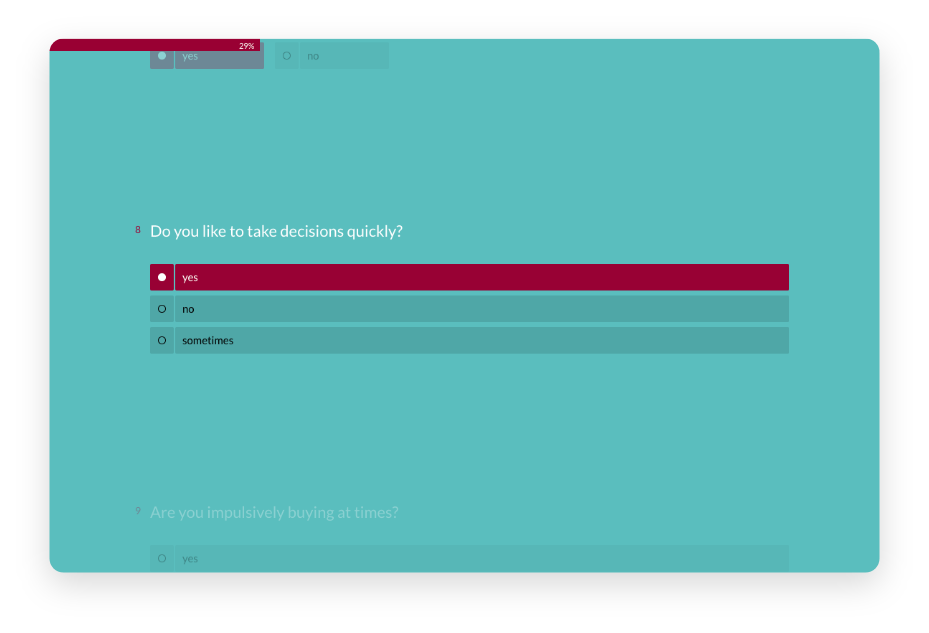
Target Group Definition
Which industry uses my product? Which departments and people are my potential target audience? Learn who your customer is to target marketing efforts more effectively.
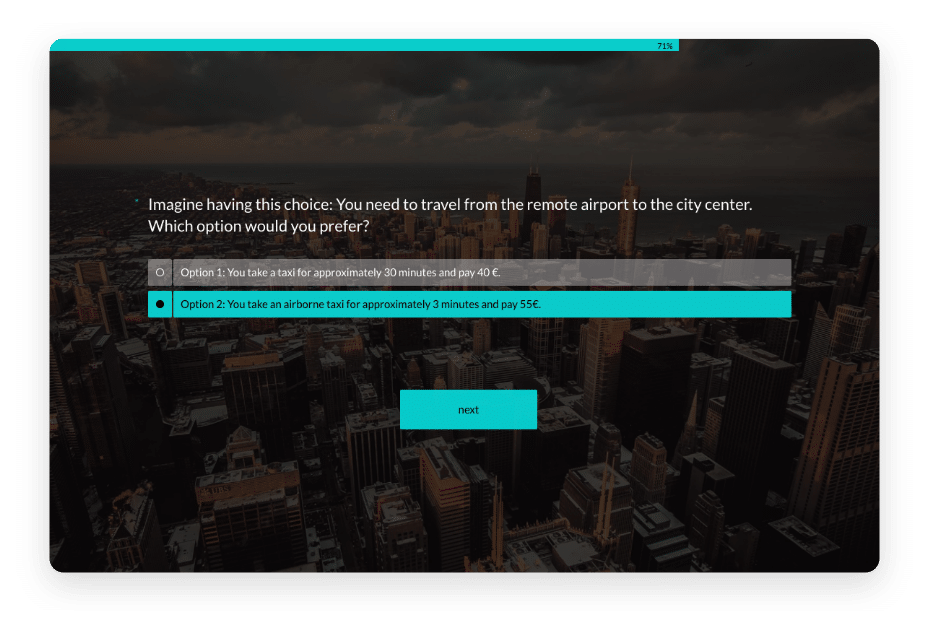
Product Launch
How does the market react to your new product? Is the need already there or does it still need to be awakened? Use this template to evaluate the needs in the market.
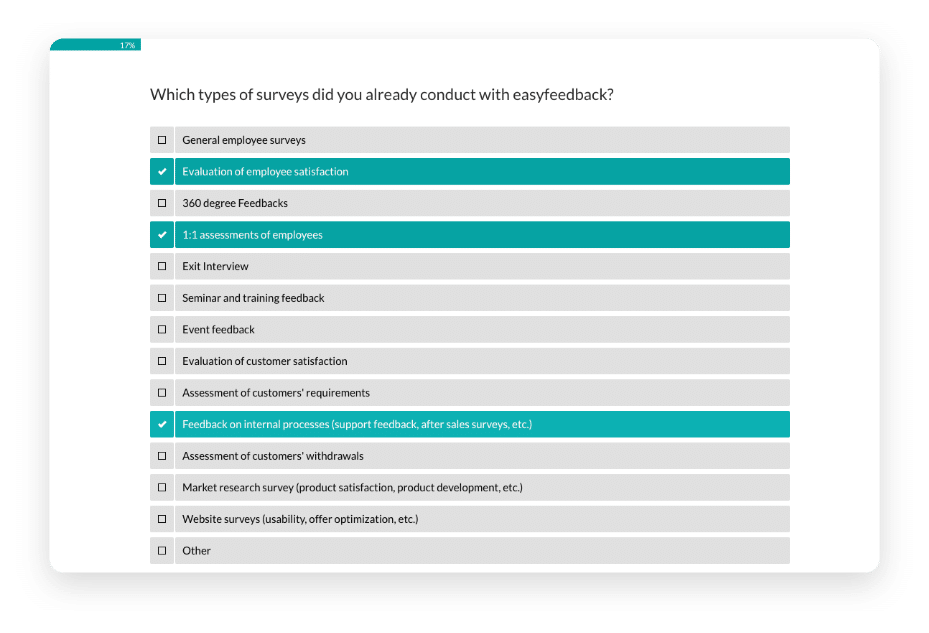
Product Optimization
How is your product used? Which areas of the software are of particular interest to your customers? Find out where the highest demand and customer benefit lies with this template.
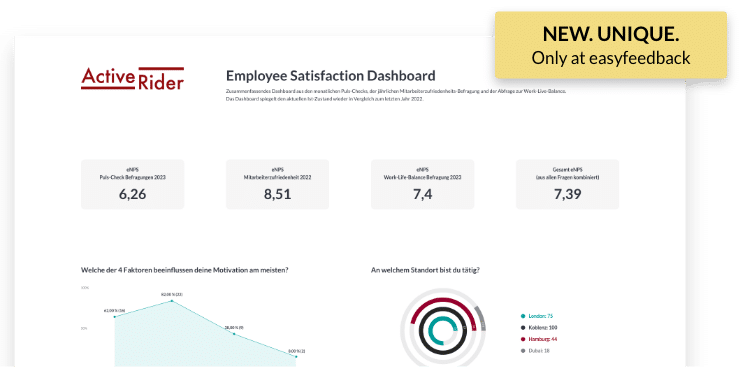
Your brand. Your appearance.
Logo, color, font – the elementary design elements of your brand.
Simply transfer the corporate design to your online survey.

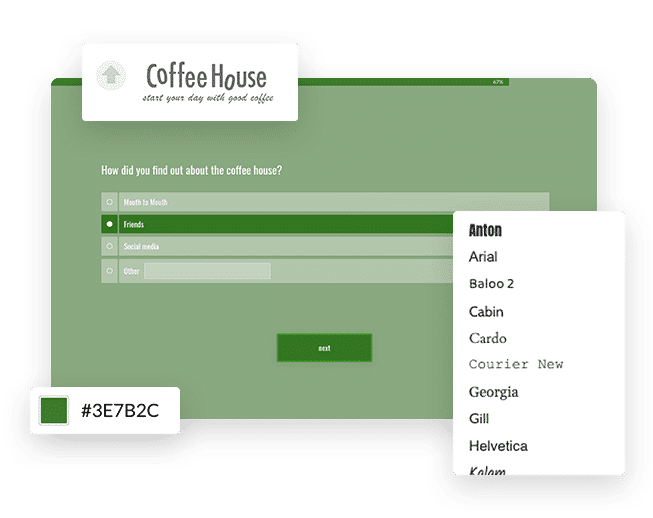
Layout configurator
Mobile optimized usability
CSS-Editor
Real-time target group feedback
The goal of market research is to discover trends with the intended target group and to align the offer accordingly. With the extensive evaluation you receive the feedback in real time.

Total or segmented display
Comparative representation
Share reports
Expert knowledge for market research surveys
To help you conduct your market research survey as effectively as possible, we provide expert knowledge.




easyfeedback Blog - Experience Management
How to use surveys correctly in experience management.

Video instructions
Create, invite and evaluate survey – all explained for you in individual videos.
Almost everything you need to know about market research
What is market research?
Market research is the systematic collection, processing, analysis and interpretation of data on the market characteristics of an industry.
The data and their interpretation serve as an entrepreneurial decision-making aid, for example, for the further development of products and services, for testing the effectiveness of marketing measures, for identifying and getting to know target groups or for assessing market risks.
What are the goals of market research?
The basic goal of market research is to gather decision-relevant findings on a specific object of investigation.
With the help of the data collected, companies can, for example, become better acquainted with the markets in which they operate or which they are targeting and react accordingly to certain situations.
Furthermore, with the help of a market research, the following goals can be pursued, among others:
1. Discover opportunities and developments.
With the help of market research and competitive analyses, existing and new markets and segments can be discovered and the purchasing behavior of the target group and its needs can be identified.
2. Recognizing and limiting risks
With the help of targeted market research, risks that arise, for example, through the introduction of new products or new competitors, can be identified and limited at an early stage. Wrong decisions due to wrong or ill-considered actions, for example in pricing policy, communication or product design, can be minimized with the help of valid data.
3. Identify trends.
How has the market, consumer behavior or even demand changed? What are the technological innovations and new developments? Are there risks or conflicts, or have social values and needs evolved?
Trend research can be used to identify changes in society in terms of new perceptions, ways of thinking, behavior and consumption patterns or technological preferences. A trend basically describes the future direction in which society is moving. As a subfield of market research, identifying trends can help you gather valuable information and stay one step ahead of the competition.
4. Simplify strategy development and decision making
A market research analysis will continue to give you guidance on how to develop an effective business strategy and help you decide which products are best to launch and when. Furthermore, you can use the data collected to derive forecasts for market development and thus respond better to the fluctuations of the market.
5. Success control and advertising effectiveness research.
Another aspect of market research is checking whether set goals or desired advertising effects have been achieved.
The analysis of whether advertising influences the behavior of potential buyers and whether this results in economic success, such as increased sales, is part of the review under which advertising effectiveness research is understood.
What types of market research are there?
Basically, market research can be divided into different areas.
One form of market research is primary market research. This involves the initial collection of data obtained, for example, through surveys, through observations, through panel research or through experiments and tests.
A second form is secondary market research. In this type of research, one falls back on data that has already been collected, which is processed for one’s own subject of investigation, interpreted and used, for example, for trend analyses, studies or for internal company purposes.
Another form of market research is demoscopic market research, in which human behavior is investigated as the cause of market conditions. Sociological, psychological and socio-psychological aspects are used for the research.
Furthermore, there is the ecoscopic market research. Here, objective market conditions such as market size, market potential, market volume, market share and market growth are researched.
What forms of data collection are distinguished in primary market research?
On the one hand, there is quantitative market research in which data is collected via large and representative samples, for example through (online) surveys, personal, written or telephone interviews. The goal of this type of survey is to collect measurable values for the creation of a statistical evaluation.
On the other hand, there is qualitative market research, which is used for a small, non-representative target group. Through interviews, group discussions or psychological test procedures, deeper insights are to be gained. The resulting data is interpreted in terms of the context to be investigated.
Why is market research important for companies?
Many companies often act on gut instinct. For example, they develop business models or strategies without (properly) knowing the target group and the market. This also results in products that are neither in line with expectations nor needs for the intended target group.
Even simple market research – in the form of a questionnaire – can provide valuable insights to reduce the potential risks of such decisions made on the basis of gut instinct. In addition, products and entrepreneurial actions can thus be managed purposefully in order to generate sales and remain competitive.
But it also makes sense for companies to establish market research as an important discipline within the company in order to continuously identify new trends and opportunities or recognize customer needs and changes in the market at an early stage.
What are tools and methods of market research?
Depending on the type of survey, the objective pursued and the form of market research, there are different methods and tools for collecting valid data on the subject under investigation. Below we have briefly explained the most important methods of market research:
Experiments:
Experiments make it possible, for example, within the framework of market and product tests, to test advertising measures for effectiveness or to investigate the extent to which packaging design promotes the purchase of products. Basically, an experiment serves to test the cause, effect and correlations under controlled conditions.
Measurements:
A measurement is always suitable as a tool when it comes to researching facts with the help of fixed measures such as weight or time. These can be concretely recorded and compared with a measurement.
Surveys:
Whether online, in writing, by telephone or in person, surveys are still one of the most common methods in market research to collect valuable data for the investigation of facts.
Surveys have the advantage that, depending on the form of implementation, they are cost-effective and flexible to use and scalable, a broad mass can be addressed and the necessary data is available relatively quickly. There are many other advantages, why surveys are one of the most common survey instruments in market research.
Interviews:
Whereas surveys are about getting information from a broad mass quickly and easily, interviews can be used to conduct fewer, but more qualitative surveys due to the greater amount of work involved.
Interviews can be conducted in person or over the phone, and depending on how the conversation progresses, more in-depth questions can be asked of participants.
Social Media Listening:
Do you know how your brand, product or service is perceived in social media? With so-called social media listening, company- or product-related likes, comments, tweets and more can be tracked on social networks.
“Listening” to and collecting this information helps companies explore their brand’s image, learn about consumer expectations and needs regarding the company and product, and use the knowledge to identify areas for improvement and to better align marketing campaigns.
Focus groups:
A focus group is a flexible research method in which several people meet together with a trained moderator – for example, at a neutral location or via a digital channel – to discuss a specific topic. The moderator’s role here is to guide the conversation of the focus groups and thus obtain as much valuable feedback as possible.
Focus group research, in particular, allows for honest and direct feedback and deeper immersion into the topic.
Panels:
If you want to survey a consistent group of people on the same topic at regular intervals and over a longer period of time, then the panel survey is suitable as a representative research method. Repeatedly querying this group of participants enables changes over time to be measured and investigated, for example when researching consumer behavior.
Diary studies:
If products are to be observed with regard to usage and use over a longer period of time, diary studies are suitable as a valuable research tool. Here, research participants are asked to record their behaviors and usage habits regarding a specific product in the form of a diary. There, they write down everything they do relating to the product.
These diaries are then analyzed and evaluated in terms of frequency of use, functionality, mention of problems during use, and much more.
Document analysis:
Document analysis is a research tool in which data from previous projects and developments is collected, managed and stored. This data is formed from different and existing sources of information such as text files, images, videos, sketches, books and more, and interpreted in relation to the research question under investigation.
The particular advantage of this data collection technique lies in the low effort required for the collection of the data itself, since all sources of information are already available and no subsequent or further documentation may be required. Furthermore, the operational process is not disturbed and the data analysis can be interrupted and continued at any time.
However, with this type of research, it must be questioned whether the sources of information used fit the subject of the investigation, how up-to-date they are, and whether the interpretation of the data does not perhaps allow too much leeway.
What are application areas of market research?
In general, market research is a means of gathering information that serves as a decision-making aid for the strategic orientation of a company.
Depending on the research purpose, market research can be used flexibly in different areas to collect and analyze data relevant to decision-making. Examples of the use of market research include competitor and target-group analyses, measuring customer satisfaction and customer loyalty, or product and pricing analyses.
Researching one’s brand in terms of perception and reputation also represents another example of the application area of market research.
In the end, regardless of the application area, market research is about discovering trends and opportunities, gathering new insights, and reducing the risk of making bad decisions.
How does market research work? How do I proceed?
If you decide to conduct market research on a specific topic, the process must be well prepared in advance in order to avoid possible mistakes. In order to provide you with a systematic approach, we have summarized the process of a market research in 5 aspects below:
1. Problem specification and goal definition
At the beginning of any market research there is the analysis of the initial conditions and the objective. What data do I need to eliminate my problem or achieve my goal? What marketing problem do I have?
2. Choice of research design
This is about precisely defining the information needed and developing an appropriate design for obtaining the data. Important points here include defining/selecting the target respondents to be interviewed, choosing the data collection and analysis method, setting the schedule.
3. Data collection
Once the data collection method is determined, the data is collected. This can be done in a variety of ways, such as written, in-person, telephone, or Internet-based.
4. Data analysis and data interpretation
Data collection is followed by data analysis and interpretation. Here, the data is first processed and then put into context for the company. This results in the consequences for upcoming decisions.
5. Communication of results
After the data has been analyzed and interpreted, it is prepared in the form of a report or presentation, for example, and communicated to decision-makers and users of the research.
What does market research have to do with marketing?
Quite simply. Marketing is designed to increase a company’s sales through appropriate advertising measures. The advertising measures used are aimed at the needs, wishes and expectations of potential customers. In order to find out about these needs, wishes and expectations of the potential customer, systematic research is required.
With the help of market research, for example, the target group can be defined and the needs of this target group can be determined. Information is collected that helps, for example, to develop a marketing strategy to better target advertising campaigns or social media actions to the needs of this target group. But this data can also be put to good use for product development, so that products are optimized in line with the market and expectations.
If decisions are to be made about the future marketing strategy or corporate direction, then market research with interpreted data can make a valuable contribution to reducing the uncertainties involved in decision-making.
How can easyfeedback help with my market research?
Very simple. If you want to create and conduct standalone online market research surveys with just a few clicks, then easyfeedback is just what you need. With our diverse invitation options, we enable you to reach a very large audience worldwide, cost-effectively and in a short time.
Furthermore, if your research project is international in scope, you can add as many languages as you like to your questionnaire. Do you value anonymous participation? Surveys with easyfeedback are by default 100% anonymous. If you want participants to have more confidence in the anonymity of the survey, we offer an anonymity function that displays an additional seal when activated.
For example, after completing your survey, conveniently invite participants via email, social media, QR code, or your own website and get real-time insight into the results.
With our real-time evaluation, you get early insights into trends, opportunities and risks. Filter responses by time periods, participant groups, or response behavior, compare survey results with each other in the form of charts and tables, or export your research data for further processing. Easyfeedback offers you extensive evaluation options for maximum insights.
Last but not least: Don’t worry about privacy, we’ll take care of that for you. Because surveys with easyfeedback are GDPR-compliant and run exclusively on servers in Germany.
Just try out easyfeedback and benefit from the advantages of our tool.
More than a survey tool

Excellent support
You are a professional or you are creating a market research survey for the first time. If you need help, our excellent support is here to help.

Certified IT security
To protect your data, easyfeedback has been certified and only works with certified service providers.

Thousand integrations
Connect to thousands of apps to more efficiently connect your data to other tools in a workflow.



